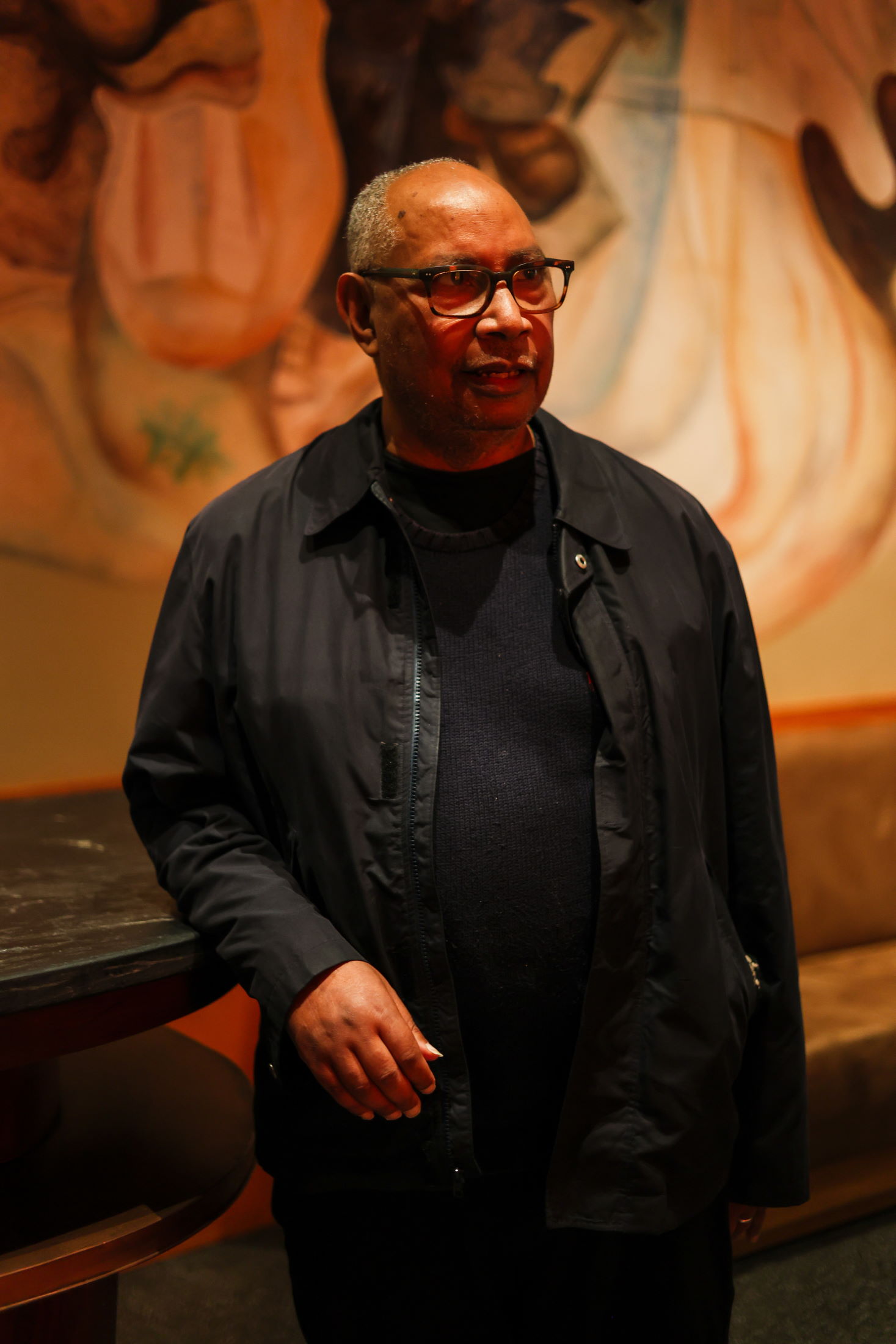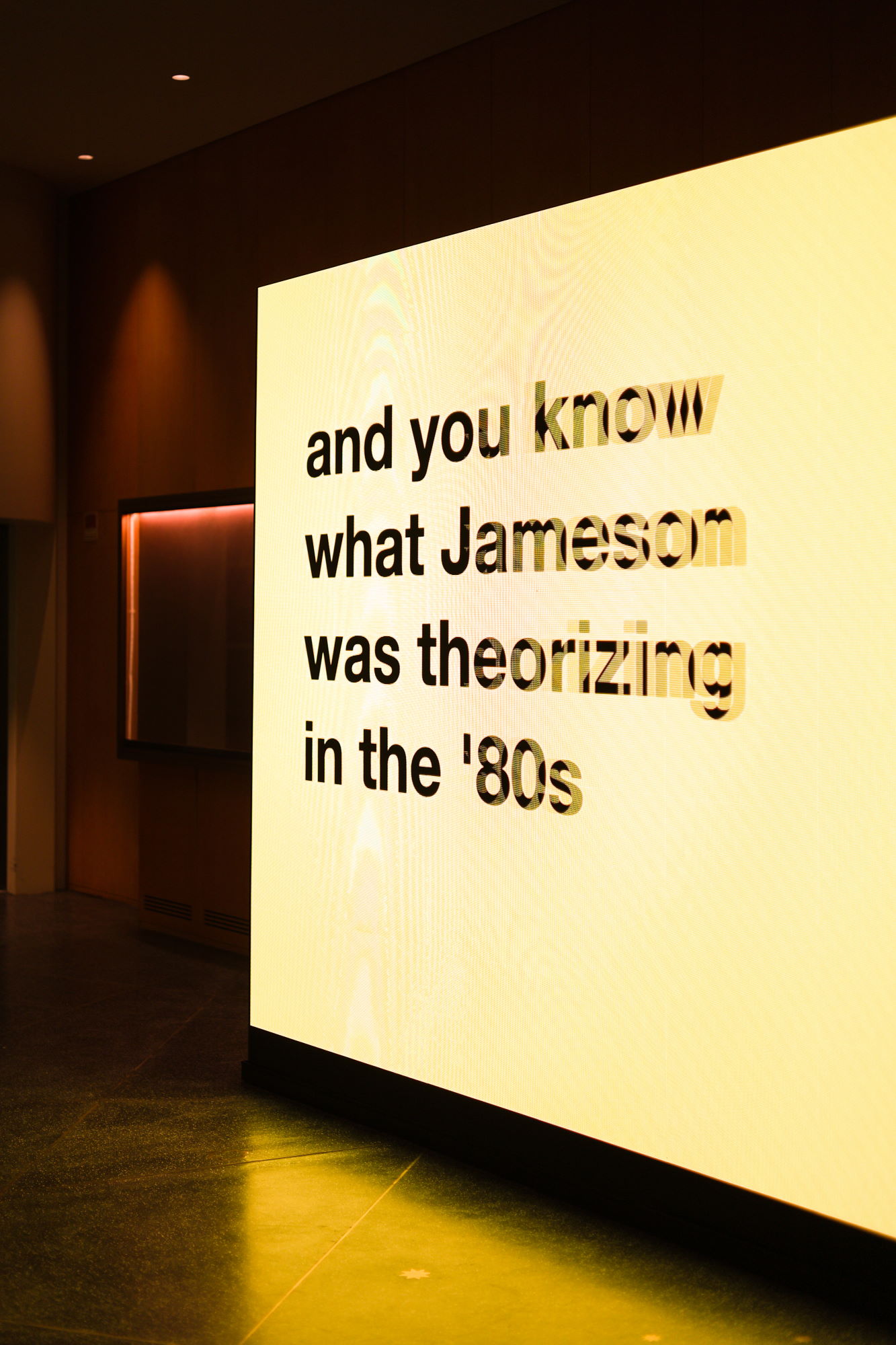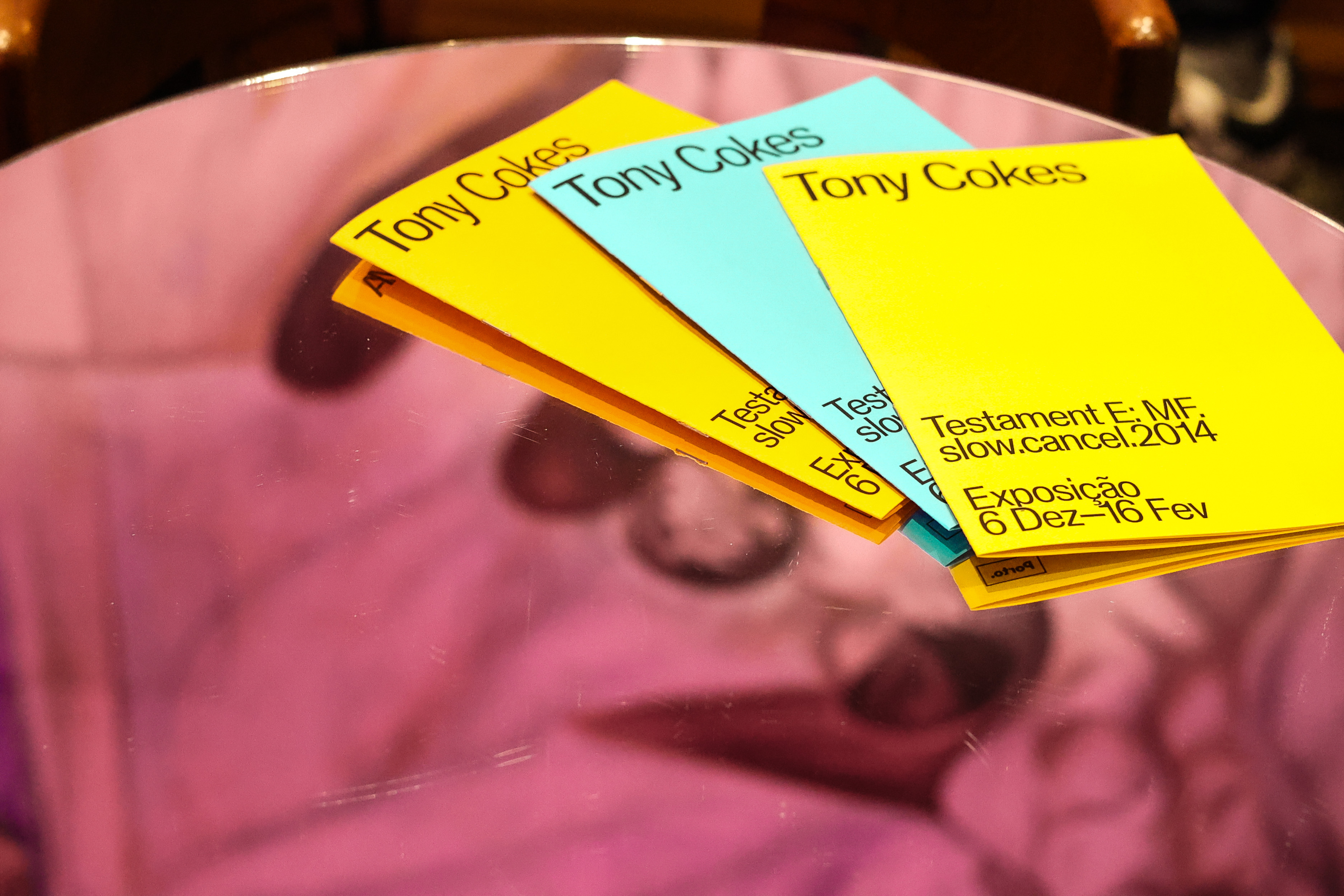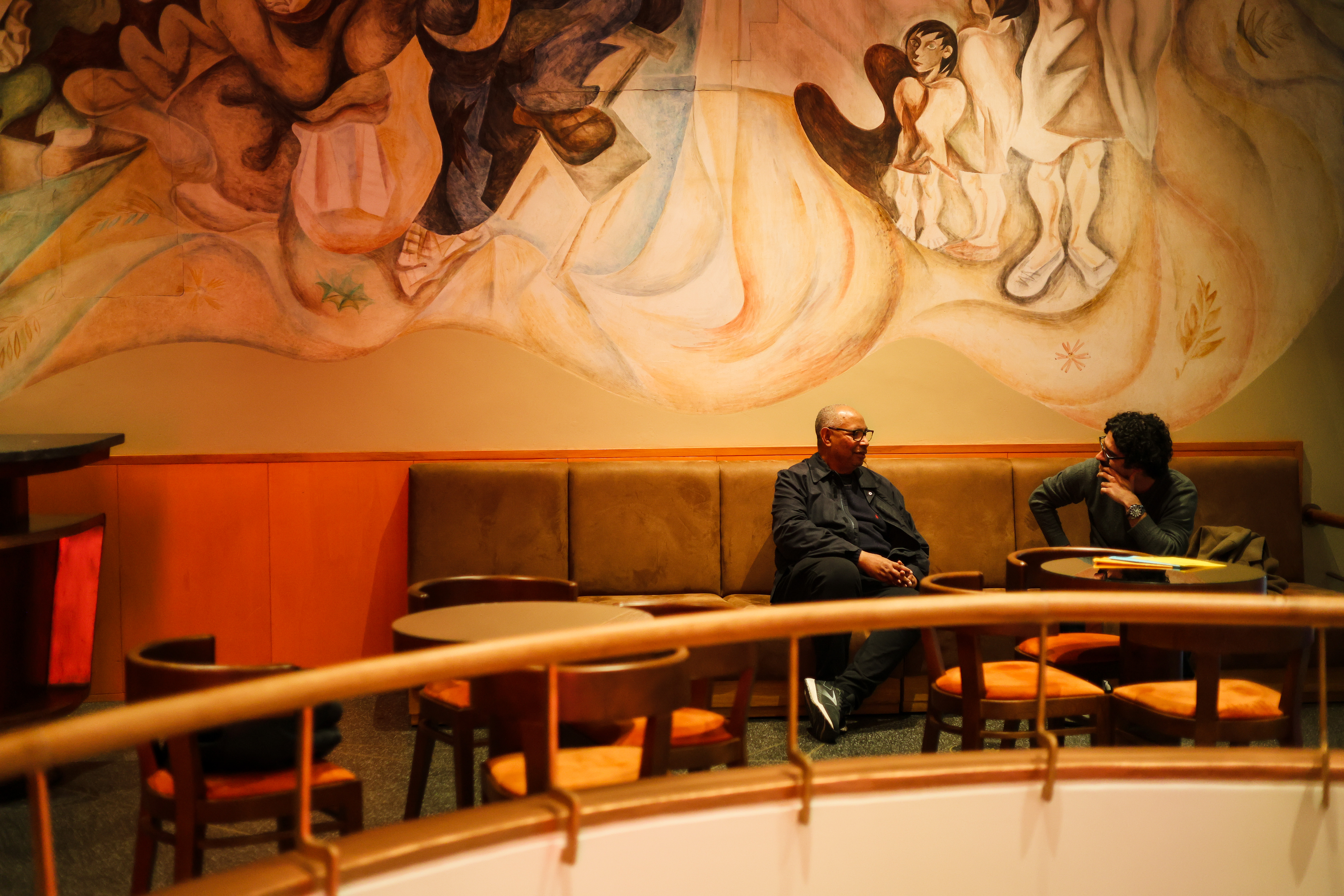EN

With low lights and music playing throughout the venue, Batalha will open ‘Testament E: MF.slow.cancel.2014’, the first solo exhibition in Portugal by American visual artist Tony Cokes. This exhibition brings together works from different points in the career of the American visual artist, known for his format of textual messages applied to vibrantly coloured backgrounds. These messages cross critical texts and essays on systems of power with uptempo pop music.
Derrick May, Kraftwerk, and New Order will ring through the corridors of the Batalha Cinema Centre, while Britney Spears will be the focus of the work that will be on continuous projection in Room 1. We spoke to Tony Cokes about his method, and what to expect from this exhibition.
Agenda Porto: On the outset of your career you relied more on archival images and found footage. What made you shift to bare text on a vbrant background instead?
Tony Cokes: You know it's kind of two things., although I wish it were only one. In the early 2000s, just after 9-11, I was working on two different projects. On the one hand, I was working on a kind of repertoire of images in and around the "war on terror", and I was not sure whether I wanted to be dealing in traumatic images — these images were already circulating. I didn't need to recirculate them. And I thought it might be easier and maybe more effective to talk about them in their absence. At the same time, there were gaps in archives, or things that were not recorded.
And on the other hand, there was a project were I had written some short essays about then contemporary popular music, and I used kind of looped clips of a generic music video. And I wondered what would happen if I just removed that clip and just concentrated again on the text.
So at a certain point I said no to traumatic images, no to images of popular culture, just to see what would happen, and I liked the effect — it took me back to the tropes of conceptual art and minimalism. But at the same time, using vocabulary that they would never use — a lot of structuralist films, for instance, have no soundtrack.

© Inês Aleixo
AP: Music, however, is vital for your work
TC: I thought it might be interesting to kind of fill that gap or to do things kind of using certain visual approaches and techniques, but adding sound to them. Ways of re-encoding, if you will, things that had already been read or been received.
AP: So you don't see pre-recorded, studio music as sort of a flat message, then?
TC: There are layers and a kind of production process in the music itself. And, for me, it's almost a kind of substitute for traditional montage, if you will, in a documentary or in a narrative film, having this kind of process that's going on that seems to be in the background. So it's, for me anyway, it's kind of a complimentary and maybe complicating presence in the work.

© Inês Aleixo
AP: So what can you tell us about "Testament", the work that you're premiering at Batalha?
TC: Some time back I was asked to do a kind of performative presentation. And I decided that I'd been thinking about texts by Mark Fisher for a very long time. So what I did was I took a recording from YouTube and kind of transcribed it — there were a bunch of errors in it, like capitalization and punctuation were off, but I was kind of interested in some of those errors. I decided that I wanted to use that text that I had kind of generated and edited, like switching back and forth between first person and third person as the basis for another piece. And so it was one of those things where I had this idea of a kind of time travel, where something that was written and presented at one point in time, how would it resonate at a different point in time, like 10 years, basically, after it was initially presented. And I found some uncanny, just sort of similarities and gaps. And one of the things that the text talks about is this dislocation of linear time and linear history which is something that I'm fascinated by so it just seemed like a really interesting thing to work on. In the text, Mark Miller is asking questions about whether we can tell if popular music has progressed, or is it doing a series of loops, cycles.
AP: So this all takes off from Mark's original conference text, but you spoke about a performative side of it, as you read and embody his words.
TC: Yeah, I kind of just re-performed it in a way. Again, at a distance, as a different person, almost as an actor. I'm kind of also interested in that question of who's speaking and in what context and I thought it would be interesting to take something that I knew was from elsewhere and present it in a different time and place.
AP: Speaking of time, this exhibition is sort of anthological in a way, it covers a pieces across several years of your work.
TC: I tend to look at exhibition practices as opportunities to juxtapose and redefine the context of work. And in the same way that I often approach the textual and musical components as ways of recasting and reframing them, I think that that's something that can happen to individual works and their relationships, both historical and content-wise. And I kind of like the idea that I get to revisit them in a different context, almost more for my edification than the edification of audiences. You know, it's fun for me!
AP: so did you have fun setting up this exhibition?
TC: I most certainly did! You know, people, for instance, always ask me for specs or, you know, whatmy preferred conditions are for displaying the works. And I always like to actually think about that in relationship to a space or spaces.

© Inês Aleixo
AP: Usually artists have very specific requirements for displaying their work. You're more freeform, then?
TC: In retrospect maybe it's related to how I wound up training as a sculptor even though I didn't make sculpture. The reason I have a degree in Sculpture is because there was no real department for media as a kind of separate enterprise. Although I didn't actually make sculpture, it did lead me to think about ways of presenting and histories, if you will, of presenting media art. I remember being in an exhibition with painting and sculpture where I presented a monitor on a pedestal. And a person came up to me at the opening of the show and basically said "I don't know what to do with this here, because if I spend two minutes looking at a painting, that's a very long time. So I don't know what to do with this thing that kind of has time". And I remember thinking "I can't make you do anything, that's your business". You can present the same information in a variety of scales, in a variety of technology, and I kind of like that. I don't see this as a difficulty or a problem, that's treating media as an object, which I'm not sure it is.
by Ricardo Alves

© Inês Aleixo
Share
FB
X
WA
LINK
Relacionados


